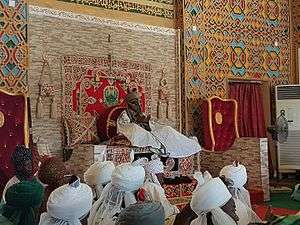Emir
An emir (/əˈmɪər, eɪˈmɪər, ˈeɪmɪər/; Arabic: أمير ʾamīr [ʔaˈmiːr]), sometimes transliterated amir, amier, or ameer, can refer to a king or an aristocratic or noble and military title of high office used in a variety of places in the Arab countries, West Africa, Afghanistan and in the Indian subcontinent. The term has been widely used to denote a "commander", "general", or "leader" i.e. Amir al-Mu'min. The feminine form is emira (أميرة ʾamīrah). When translated as "prince", the word "emirate" is analogous to a sovereign principality. In contemporary usage, the term indicates to some Muslim head of states of Emirates or leaders of Islamic organisations.
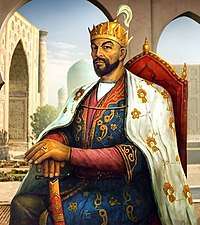
Origins
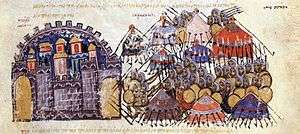
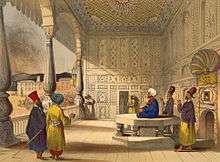
Amir, meaning "lord" or "commander-in-chief", is derived from the Arabic root a-m-r, "command". Originally simply meaning "commander”, it came to be used as a title of leaders, governors, or rulers of smaller states. In modern Arabic the word is analogous to the title “Prince". The word entered English in 1593, from the French émir.[1] It was one of the titles or names of the Islamic prophet Muhammad.
Princely, ministerial and noble titles
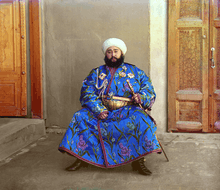
- The monarchs of Qatar, Kuwait and of the constituent emirates of the United Arab Emirates are currently titled emir.[2][3][4]
- All members of the House of Saud have the title of emir (prince).[5][6][7]
- The caliphs first used the title Amir al-Muminin or "Commander of the Faithful", stressing their leadership over the Islamic empire, especially over the militia. The title has been assumed by various other Muslim rulers, including sultans and emirs. For Shia Muslims, they still give this title to the Caliph Ali as Amir al-Muminin.
- The Abbasid (in theory still universal) Caliph Ar-Radi created the post of Amir al-Umara ("Amir of the Amirs") for Ibn Raik; the title was used in various Islamic monarchies; see below for military use
- Formerly in Lebanon, the ruling emir formally used the style al-Amir al-Hakim, specifying it was still the ruler's title. Note that the title was held by Druze and Christians as well.
- The word emir is also used less formally for leaders in certain contexts. For example, the leader of a group of pilgrims to Mecca is called an emir hadji, a title sometimes used by ruling princes (as a mark of Muslim piety) which is sometimes awarded in their name. Where an adjectival form is necessary, "emiral" suffices.
- Amirzade, the son (hence the Persian patronymic suffix -zade) of a prince, hence the Persian princely title mirza.
- The traditional rulers of the predominantly Muslim northern regions of Nigeria are known as emirs, while the titular sovereign of their now defunct empire is formally styled as the Sultan of Sokoto, Amir-al-Muminin (or Sarkin Musulmi in the Hausa language).
- The temporal leader of the Yazidi people is known as an emir or prince.
- Amīr al-Baḥr (أمير البحر, "commander of the sea") is considered to be the etymological origin of the English admiral, the French amiral and similar terms in other European languages.
Military ranks and titles
From the start, emir has been a military title. In the 9th century the term was used to denote a ruler of a state i.e. Italy's Emirate of Sicily.
In certain decimally-organized Muslim armies, Amir was an officer rank. For example, in Mughal India, the Amirs commanded 1000 horsemen (divided into ten units, each under a sipah salar), ten of them under one malik. In the imperial army of Qajar Persia:
- Amir-i-Nuyan
- Amir Panj, "Commander of 5,000"
- Amir-i-Tuman, "Commander of 10,000"
The following posts referred to "amir" under medieval Muslim states include:
- Amir al-umara, "Amir of Amirs" (cfr. supra) or 'Commander of Commanders'
- Amir al-hajj, "Commander of the Hajj [caravan]"
- Amir al-ʿarab, "Commander of the Arabs [Bedouin tribes]"
In the former Kingdom of Afghanistan, Amir-i-Kabir was a title meaning "great prince" or "great commander".
Muhammad Amin Bughra, Nur Ahmad Jan Bughra, and Abdullah Bughra declared themselves emirs of the First East Turkestan Republic.
Other uses
- Amir is a masculine name in the Persian language and a prefix name for many masculine names such as Amir Ali, Amir Goul.
- Amir-i-Iel designates the head of an Il (tribe) in imperial Persia.
- The masculine Amir and feminine Amira are Arabic-language names common among both Arabs regardless of religion and Muslims regardless of ethnicity, much as Latin Rex and Regina ("king" and "queen," respectively) are common in the Western world. In Bosnia and Herzegovina, the female name Emira, often interpreted as "princess", is a derivative of the male name Emir.
- The masculine Amir and feminine Amira are Hebrew-language names that are relatively common in Israel. In Hebrew the word can also mean "bundle of grain" or "treetop" depending on the spelling.
See also
- Specific emirates of note
- List of emirs of Harar
- List of emirs of Kuwait
- List of emirs of Qatar
- List of emirs of Mosul
- Emirate of Afghanistan
Notes
- Harper, Douglas. "amir (n.)". Online Etymology Dictionary. Retrieved 29 June 2017.
- "Emir of Kuwait wraps up Gulf mediation visits - Qatar News - Al Jazeera". www.aljazeera.com.
- "Archived copy". Archived from the original on 2018-01-15. Retrieved 2018-01-15.CS1 maint: archived copy as title (link)
- Brown, Holly; Hellewell, Matthew; Westbourne, Jessica; Farrow, James. A Life and Times of the Fotherington Family - First Edition. Lulu.com. ISBN 9781326732967 – via Google Books.
- Amos, Deborah (1991). "Sheikh to Chic". Mother Jones. p. 28. Retrieved 12 July 2016.
- "Saudi Arabia: HRH or HH? - American Bedu". 7 August 2016. Archived from the original on 7 August 2016.
- "Family Tree". www.datarabia.com. Retrieved 7 December 2016.
